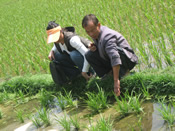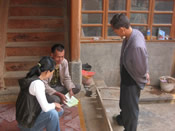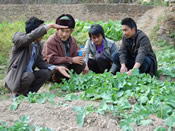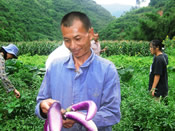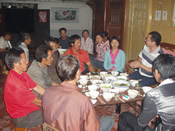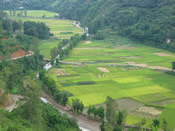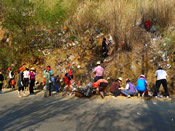By Yang Lifen (Former Assistant Programme Officer for Shiping Programme in Yunnan, PCD)
 A Dapinhuo in Shiping, Yunnan Province, involves villagers gathering together for a hearty meal. During this eating spree, participants have a chance to share and discuss issues in a lively and merry atmosphere. The foremost importance of a dapinghuo lies in providing a platform for everyone to sit together and exchange ideas. Huo means getting together to discuss or do something. Pin, which in Chinese means drawing something together, can refer to food, resources, ideas or actions… Concerted effort is required if something of concern to all people is to be dealt with, while such effort is also called for if people wish to turn ideas into actions.
A Dapinhuo in Shiping, Yunnan Province, involves villagers gathering together for a hearty meal. During this eating spree, participants have a chance to share and discuss issues in a lively and merry atmosphere. The foremost importance of a dapinghuo lies in providing a platform for everyone to sit together and exchange ideas. Huo means getting together to discuss or do something. Pin, which in Chinese means drawing something together, can refer to food, resources, ideas or actions… Concerted effort is required if something of concern to all people is to be dealt with, while such effort is also called for if people wish to turn ideas into actions.
Eating, drinking and talking about important matters
In Yunnan, the Dapinhuo is very popular in rural areas. During the slack winter season or festivals, or when a rare wild animal is caught, a few friends will find a cosy place, cook and have a hearty meal together. This custom of getting together to share food and have intimate conversations is known as a dapinhuo. How is it organised? Sometimes everyone brings their own cooked food and wine. Sometimes someone collects grain and vegetables from the field and picks some firewood nearby, and then everyone cooks together. Sometimes everyone contributes to buying wine and meat. There is a saying: “Work together and you’d be well fed and clothed!” Little attention is paid to how the food is cooked. The gist is to have a great time eating, drinking and chatting.
In the old days in traditional agricultural societies, rural families could lead a normal life only when they helped each other out. In those days, the dapinhuo was particularly important. There is no precise way to do it and it is not restricted to any age group. Not only is it a gathering for a hearty meal, but it is also a means to express and communicate emotions and feelings. In 2009, PCD’s programmes in Xiaowanzi Village of Shiping County[1], which had been providing support to the community to build infrastructure, shifted their focus to facilitating villagers’ learning through reflection and action on sustainable living and ecological health. This was a new challenge for us. First, we had to find out what public issues villagers were concerned with, make use of the issues for intervention and learn how they dealt with problems they faced. We discovered that villagers enjoyed getting together to eat and chat instead of sitting seriously in a meeting room, which is the way urban people adopt for solving problems. Eating and chatting around a dining table, one will feel more relaxed, cheerful and carefree. Because of this, we decided to make use of the dapinhuo as a means for exchange with the villagers.
Actions after dapinhuo
At the early stage of the programme, we did a lot of work on garbage-sorting and consciousness-raising in the village. One day when I went around in the village with Yonghua, a local partner, I noticed that the street had become very clean, but there was a heap of garbage at the side of the river. An auntie told us that collective action to clean up the village had been organised the day before. Everyone had joined in. The plan was to use a truck to take the garbage up the hill. However, after a few rounds, there was no more diesel for the truck and thus the remaining garbage was left at the side of the river. Even then I was glad to learn that some kind of change was taking place in the village. When the project first started, only two villagers, He Zhengrong and Su Yingping, took part in the activities. I had felt anxious and wondered what could be done. Therefore I could not but feel delighted with the fact that the villagers were organising collective labour. So long as they begin to take action, there is hope. Of course, if they dump the garbage into the river it would be a problem. I encouraged them to discuss the disadvantages of dumping the garbage into the river. Six months later, after much discussion, the villagers turned the garbage into ash “as fertilizers” by burning it. The location used for dumping garbage has become a small vegetable farm.
As public consciousness grew, everyone suggested growing trees on the hill at the back of the village. The forest protecting the village had been burnt down in a fire the previous year, and villagers were worried about landslides. They decided to grow trees together and this was planned for last March. Coincidentally the Tree Planting Festival was in March and it was also around this time that the midterm evaluation of the programme took place. For the first time, a dapinhuo was held by the villagers at noon. Perhaps I was anxious myself; the atmosphere felt a bit strange. The men ate quietly and the women, who were used to talking loudly and making fun of each other, also kept silent and behaved themselves. During the gathering, only we PCD colleagues raised a few questions and the villagers replied briefly about the tree-planting activities in the afternoon. They immersed themselves in the food most of the time.
On the day of the tree-planting, the village head went up the hill and explained briefly what to pay attention to, such as the depth of the hole, the distance between holes and the number of trees to be planted. Before he finished talking, the villagers had started to act. Even though it was raining, no one seemed to think of quitting. They continued to work till three or four in the afternoon. Seeds for Chinese red pine were sown in the area covered by a wood which is to protect the village. To celebrate the completion of the tree-planting activity, the village head invited everyone for dinner that evening. Led by Zhuqing, a group of men prepared dinner.
Solving problems with traditional virtues
Since the trees grown on the hills had long ago been changed to fruit trees and eucalyptus which are economic crops requiring much water, planting trees can help solve the tap-water problem arising from the cultivation of economic crops. To solve the problem, a few families in the village pooled some money to build their own reservoir. Pipes were also installed to bring water into their houses. There is as yet no ultimate solution for the water problem faced by the whole village. The problem of tap water is an issue that villagers always bring up when they hold a dapinghuo.
Villagers once gathered for a dapinghuo in the house of Su Yinping. There were two tables, with eight or nine people at each. As we ate, Uncle Su San said to me all of a sudden, “Xiao Yang, PCD should help us solve the problem of tap water.” Su Yinping, who was drinking wine, replied immediately: “They don’t help with hardware.” Uncle San Shu continued: “If you don’t help with hardware, what do you do?” “We help with software,” I replied. Uncle Su San raised his bowl of wine, drank a mouthful and asked: “Software? What software?” “Software means people…people’s way of thinking. For the project we are now working on, we want to work with you to learn the traditional virtues of your ancestors. Your ancestors helped each other in their production. People lived together in harmony and were respectful of nature. They were not thinking of conquering all other creatures and creation all the time. Nowadays, instead of helping each other, you have to pay for everything, right? For example, the village does not have enough water. Everyday you wake up and see the barren hills. There are no trees at all. It has been dryer than usual this year. Water is definitely becoming less,” I said to Uncle Su San. He put a peanut into his mouth, turned to me and said: “There is an old saying: ‘There’s water only if there are hills.’ It is a truth we always knew. Up on the hills there used to be trees that were a few hundred years old. They were cut down during the period when we were told (by the Government) to produce steel in our backyard. Then the hills were gradually turned into fields. A few years ago, the rest of the trees were cut down when tobacco was grown. Now we have to fetch our drinking water from the main pipe.”
We chatted with Uncle Su San until midnight. He seemed to have learnt something new about the programme. Before he left he said: “It is correct to deal with the software but it is more difficult to achieve the objective.” The dapinghuo held at that evening was hosted by He Zhengrong and Su Yinping. There was not yet a core group. After the villagers left, the wife of Su Yinping had to clean up the dishes all on her own. During the dapinghuo, issues are often brought up but the discussion usually ends without any solution. In the end, a dapinghuo seems only to result in a lot of work left for the family of the host, I thought. If it went on like this, the villagers would give up. Moreover, when the villagers raised an issue, they were hoping that outside forces would help out. But how much can an organisation do? I think what is most important is to help them gain awareness and change their life through their own actions.
Unfinished and ongoing tasks in Xiaowanzi
The programme at Xiaowanzi Village attempts to turn the dapinghuo into a platform for villagers to discuss, in an everyday context, problems the village faces and to try to find ways to deal with them. After three years of such practices, we have the following reflection. The organisers of each dapinghuo are always the same group of people and participants are people the organisers are familiar with. Some people have taken part in the dapinghuo a number of times while some have never joined in. This has limited the impact of the programme. It has also been difficult to turn discussion into actions. Discussion feels like mere talk and participants only come for a chat. In the long run, their enthusiasm will run out.
However, if we look at it from another perspective, dapinghuo is itself a part of village life. It was not our programme that triggered its existence. If we hope for something special, we may find it difficult to continue. Even if what arose was not exactly what we had anticipated, it has been kept up because of the friendship the dapinghu nurtures. Anyway a dapinghua provides a platform for everyone to come together. A dapinghuo is therefore an unfinished process that is still going on in the programme of Xiaowanzi Village.
Postscript:
Since 2011, PCD has been supporting community facilitators in our various programme sites to document their community work experience and to reflect on the direction of their work. The vigour of sustainable living in local communities is manifested in these interesting stories written by the community facilitators. This article is excerpted from one of their stories and was edited for publication here. We will continue to publish these stories in different platforms.
- The programme, “Managing the River Basin at Xincheng Township of Shiping County in Yunnan with Ecohealth Approach” covers six zirancun (geographically or traditionally defined villages, as distinguished from administrative villages) with a total of 539 households, i.e. a population of 1,868. Concrete goals of the river basin management programme are: 1. to consolidate programme activities implemented earlier in those communities participating in a former programme; 2. to enhance knowledge of protecting and managing river basin; 3. capacity building of programme partners and community facilitators.


